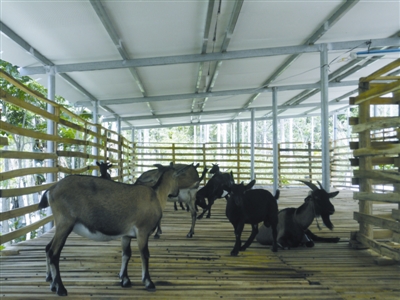Sanya provides farmers with more than 10 million yuan in subsidies to help the development of animal husbandry.
If you buy more than 20 piglets, you can get a subsidy of 300 yuan for each one.
Newly built pig and sheep barracks with a subsidy of 200 yuan per square meter

More than 20 Hainan native black goats are in the "attic" barn.
A (reporter Lin Zhimeng trainee reporter Qiao Yanan) "one end, two ends, three heads …"... The quantity is right, sign and check the information here, and we will send you the purchase subsidy for piglets as soon as possible. " This is the staff of the Municipal Animal Husbandry Bureau counted the number of newly purchased pig seedlings at the home of farmers in Guoling Village, Tianya Town on June 19. In order to help farmers develop animal husbandry and promote the development of animal husbandry in our city, Sanya once again issued a new policy to benefit the people, providing more than 10 million yuan in subsidies to farmers who buy piglets, build sheep houses, pig sheds and other barns.
There is a big subsidy for buying piglets.
Farmers want to expand the scale of farming
On June 19, 50 newly purchased piglets bought by Li Chunping, a villager in Guoling Village, Tianya Town, were eating in the newly built pig house, while the staff of the Municipal Animal Husbandry Bureau checked the number of piglets. This is a new policy of benefiting farmers in Sanya City this year. Farmers, legally registered breeding companies, and cooperatives in various villages and towns in the city can apply to the Municipal Animal Husbandry Bureau for subsidies for the purchase of new piglets. The Animal Husbandry Bureau will assess the ability and hardware conditions of farmers and determine the number of piglets they can buy. If each household buys more than 20 piglets, each will receive a subsidy of 300 yuan, and each with less than 20 will receive a subsidy of 280 yuan, which is about 50% of the current price of about 650 yuan per piglet.
Li Chunping's family bought about 20 piglets in previous years. Because of the financial subsidy, she built a new pigsty of 100 square meters. She plans to double the scale of breeding this year, raise several sows, breed more piglets through sows, and ensure the number of piglets in each batch of piglets, and then reduce some breeding costs.
"my family has been approved a subsidy of 50 piglets this year, so there will be a subsidy of 15000 yuan. When this subsidy is issued, I will be able to buy a batch of piglets and sows to raise." Li Chunping is planning.
The staff of the Municipal Animal Husbandry Bureau told reporters that not only piglets are subsidized, but farmers who raise sows can also receive 100 yuan in subsidies. These subsidies are all important measures to encourage farmers to expand their animal husbandry and support the development of animal husbandry in Sanya. Take Tianya Town as an example, this year, the Animal Husbandry Bureau approved a total of 155 households to buy pig seedlings and 4102 piglets. Relevant data show that the average number of pigs raised by farmers is about 20, and each household can receive a subsidy of about 6000 yuan.
"Farmers first buy piglets, and the staff randomly go to their homes to verify the number of piglets, and then issue subsidies, which is mainly to prevent farmers from using subsidies to buy sick piglets in order to collect the quantity." According to the staff of the Municipal Animal Husbandry Bureau, the subsidy allows farmers to have the money to buy new piglets.
The culture environment needs to be improved.
Increase production and income of animal husbandry
In the home of Luo Mingxiao, a group of villagers from the Wenmen Village Committee of Tianya Town, the newly built pig barn is 180 square meters. A sow has just given birth to more than a dozen piglets, which are placed separately in a spacious and clean barn. Pregnant sows are raised separately in a cubicle, while newly bought piglets and soon-to-be piglets are raised separately according to their growing period.
The reporter saw at the scene that the ceiling of the newly built fence house was about 2 meters high from the ground, and the roof was covered with thermal insulation foam. Standing in the barn in the hot summer, I don't feel hot, but there are bursts of natural wind blowing. There are also sewage channels in the fence, and the excreta will be collected along the pipeline to the tertiary sewage tank, which can be recycled to produce biogas, can also be used as a natural fertilizer for crops, and can alleviate the environmental pollution caused by pig farming. Some villagers also plant sweet potato leaves and eggplant around the pig house and irrigate them with collected fertilizer, and mature crops can be used as fodder.
Not far from here is the old barn of Luo Mingwen's family, which is a low pig house made of wooden strips and bricks.
"in the past, the barn was very small, starting with three piglets, with a maximum of dozens of pigs a year. With subsidies, we have built this new barn, and now we are well-off to raise more than 200 pigs, and the subsidy of 36000 yuan has already arrived. I am going to buy another batch of piglets to expand the scale of breeding. " Luo Mingwen told reporters that pig farming can produce three or four batches a year, which can generate an income of nearly 100000 yuan a year.
It is understood that the subsidy for new fence houses is 200 yuan per square meter. Statistics show that from 2013 to 2014, a total of 40 new fence houses were built in Tianya Town, covering an area of 6401.37 square meters. Among them, 32 new pig sheds with an area of 5576.37 square meters, 7 sheep houses with an area of 705 square meters, and 1 broiler house with an area of 120 square meters.
At Fu Ri Mei's home in Guoling Village, more than 20 Hainan native black goats are resting leisurely in the "attic" barn. "now there are only a dozen sheep in the barn, and when the subsidy comes down, there will be 20,000 yuan, and then we will use this money to buy a batch of new sheep." Fu Ri Mei said.
Fu Risei told reporters that the subsidy gave them enough money to build new houses, improved the breeding environment in the past, reduced the probability of death of goats due to illness, and reduced the risk of raising goats, giving them the conditions to raise more goats to increase their income.
- Prev

Viewing the Entrepreneurial thinking of the Internet of things from big data's cattle raising
Viewing the Entrepreneurial thinking of the Internet of things from big data's cattle raising
- Next

The construction of the characteristic sightseeing agricultural park in northwest Hubei Province in Laohekou invested 30 million in the first phase.
The construction of the characteristic sightseeing agricultural park in northwest Hubei Province in Laohekou invested 30 million in the first phase.
Related
- A course of planting techniques and methods on how to grow carrots
- How to plant the latest tulips?
- Is it better to pick tea in the morning or in the afternoon? When is the best time for tea to be picked? what is the third or fifth tea?
- Launch Yuanxiao Happy combination Haocha + Tea Yuan healthy Taste
- Penghu Tourism "Fireworks 20 Parade with You"
- 2022 West Lake Happiness holds "Digital Revitalization Voucher" and draws iphone13 and laptop.
- Banqiao Fuzhou social houses are designed to change start-up combined with police elimination to create a safe and livable environment
- The convenient measure of "mechanical weeding" in Xinbei has been abused and the Agriculture Bureau has imposed heavy penalties on the illegal land consolidation.
- Changgeng University Joins Hands with Four Memory Factories to Rescue Memory Talent Shortage
- The list of Taiwan's top 100 MVP managers is listed by the Director-General of the Farmers' Association of Sanxia District.

